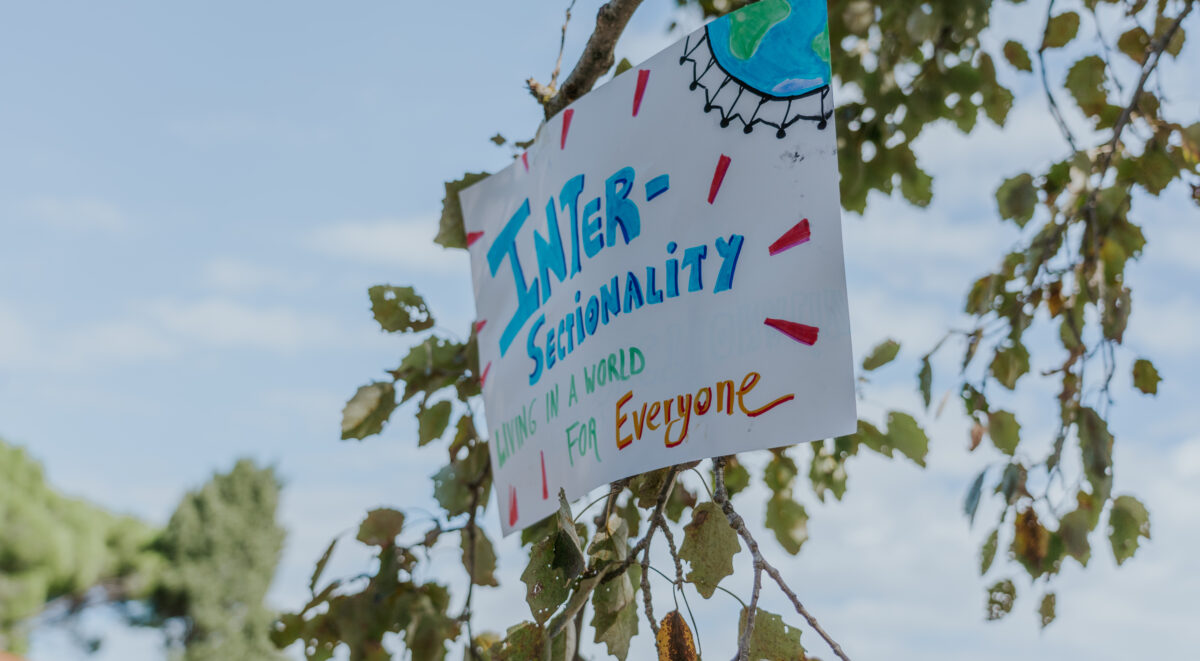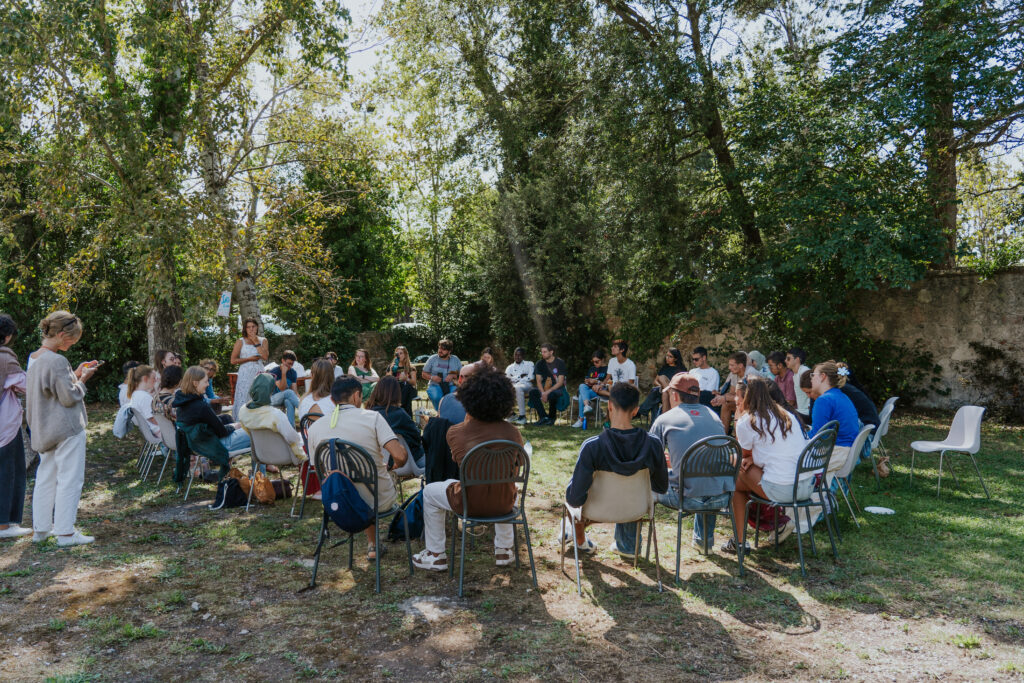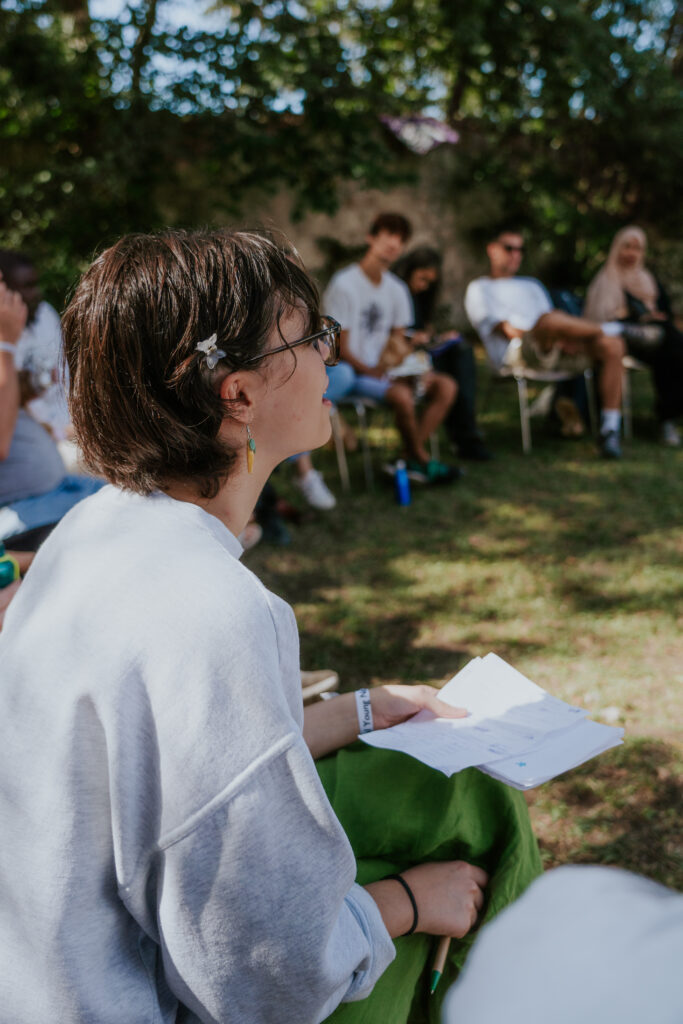
A participant in all four of our international activities of this year, Sara Salgado shares her experience with facilitating a workshop on intersectionality during our most recent activity in Italy in September.
Imagine yourself walking down a park during a late-autumn afternoon. There is a slight breeze; you can feel it on your face. (…) You hear the birds and smell the freshly cut grass. (…) You look first to your right and then to your left, you notice a young child kicking a football. The child throws the ball into the air and catches it as it falls. You notice the ball fall hard into the child’s hands. Two people are playing with the child – you smile and wave towards them noticing the smiles on their faces. You continue to walk around some large trees and pass two people sitting on a bench. They are laughing loudly – you try to hear what they are saying. You move again along the path and see a couple walking towards you holding hands. They walk past you as you look at them. As you walk on a number of men are sitting on a bench by the path, talking and laughing – you look at them one by one. (…)
When you imagined the child kicking a football, did you imagine them being a female? When you saw the two people on the bench, were they white and able-bodied? When you imagined the couple holding hands, was it a same gender couple?
It was with this exercise that me and my team started our intersectionality workshop. We wanted people to become aware of the ways our imagination is colonised; to become aware of the underrepresented groups in our society we tend to unintentionally forget about. And when it comes to the climate crisis, we can’t afford to not include underrepresented voices in the discussions for the solutions. As they say, “we’re all in the same storm, but in vastly different boats”.
For the main exercise of our workshop, we laid on the floor 6 different cards:
BIPOC Rights
LGBTQ+ Rights
People with Disabilities’ Rights
Low Income & Education
Animal Rights
Women’s Rights
We told people to join the cards for the topic they were most interested about, or wanted to learn more about. The people formed teams around the cards. Their task was to explore the relation of the card topic with climate change. Afterwards, everyone joined a discussion group where they discussed their topics with the rest of the teams.
As I was facilitating one of the discussion groups, a difficult situation came up. One person that had a BIPOC rights card was sharing that they didn’t see why we should call it BIPOC rights. They didn’t see why we needed to use these kinds of terms, when we could just use the term Human Rights in general.
Human rights is indeed an important concept, albeit a limited one. When we’re talking about human rights, we’re laying down the basic rights we think every human should have. But talking in these terms gives us no information about who’s missing these rights. We say access to clean water is a human right. But what does that mean for me, since I have water running out of my tap everyday? Who is missing this basic right?

When we say BIPOC rights, LGBTQ+ rights, or any other specific rights, we’re putting the spotlight on an underrepresented group that is not having access to the full range of the human rights they deserve. We’re shedding light on specific injustices these groups have been subjected to and that are only exacerbated by climate change.
If we link this person’s statement that we don’t need the term BIPOC rights to the social blindspots exercise we did in the beginning, we clearly see the importance of talking about specific rights for underrepresented groups.
If I was a participant, I know I would’ve started lecturing and arguing with this person, which would probably make them even more resistant to change their views. However, as a facilitator, my role was not to educate, and much less to argue and make people feel unsafe to share their own views. But at the same time I couldn’t simply ignore these kinds of statements.
Do you think the same about women’s rights? I asked them, hoping that this comparison with a more socially acceptable issue would help. Indeed, this made the person pause and reflect, and eventually recognize the inconsistency in their logic. I like this approach of giving a similar example (but that’s hard to disagree with), and giving space for people to come to their own conclusions. Sometimes it works, sometimes it doesn’t. But it is surely better than lecturing or arguing with them.
This is easier said than done. Trust me, I know how hard it is to keep your cool when people are saying very disagreeable things. I’ve spent most of my life getting angry with people over socio-political topics, and I still do. But because I had to embody the role of a facilitator for this training, I could not do that. This role forced me to deliver my message in an empathic way. And because of how well it worked, it has been changing the way I’m interacting in my personal life too.
I now think that it is part of my ethical responsibilities to try to become a better communicator in situations where prejudiced views arise. I know we can’t afford to tolerate these views, but we also can’t afford to keep driving people apart. The climate crisis demands that we come together more than ever. So, next time, when you find yourself becoming frustrated with someone, try asking questions instead of lecturing them; try being empathic even though it’s hard. In essence, try putting yourself in the facilitator’s shoes. Maybe you’ll get farther than with your own.

Sara Salgado

Funded by the European Union. Views and opinions expressed are however those of the author(s) only and do not necessarily reflect those of the European Union or EACEA and DZS. Neither the European Union nor the granting authority can be held responsible for them.
